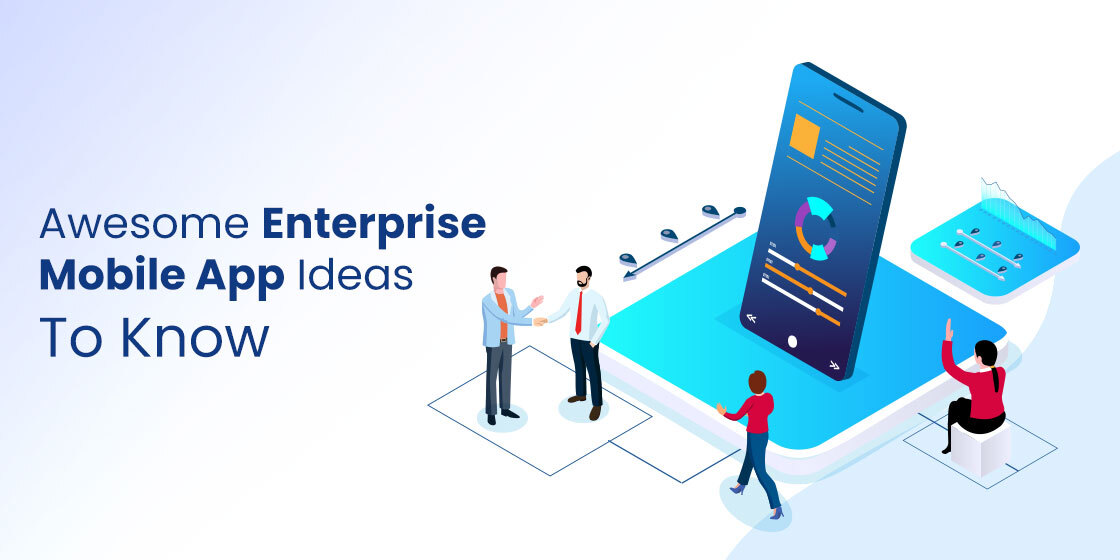Table Of Content
Discover Why Enterprise Mobile App Development is So Necessary Today
Mobile phones today are the foremost medium used today by consumers to do their daily computing. From creating, viewing, and editing a variety of documents, to communicating via audio, video, or text, mobile phones today can do everything.
So, it makes sense that in order to grow your existing business, you need a mobile app. And not a consumer app, an enterprise mobile app. Now, enterprise apps are mobile apps used by a large number of people, with an extensive database and functionality at the backend designed to solve a larger issue within an organization.
For example, an enterprise app may be something like a CRM app designed to help a company track and manage its customer relationships better. Basically, it helps your business grow by allowing you to leverage the benefits of technology to improve your functions.
So, the question is; what are some great enterprise mobile app development ideas, and how can professional mobile app development services convert them into successful mobile apps?
Let’s dive in and find out how to use the power of app development to boost your enterprise’s performance.
What is an Enterprise Mobile App?
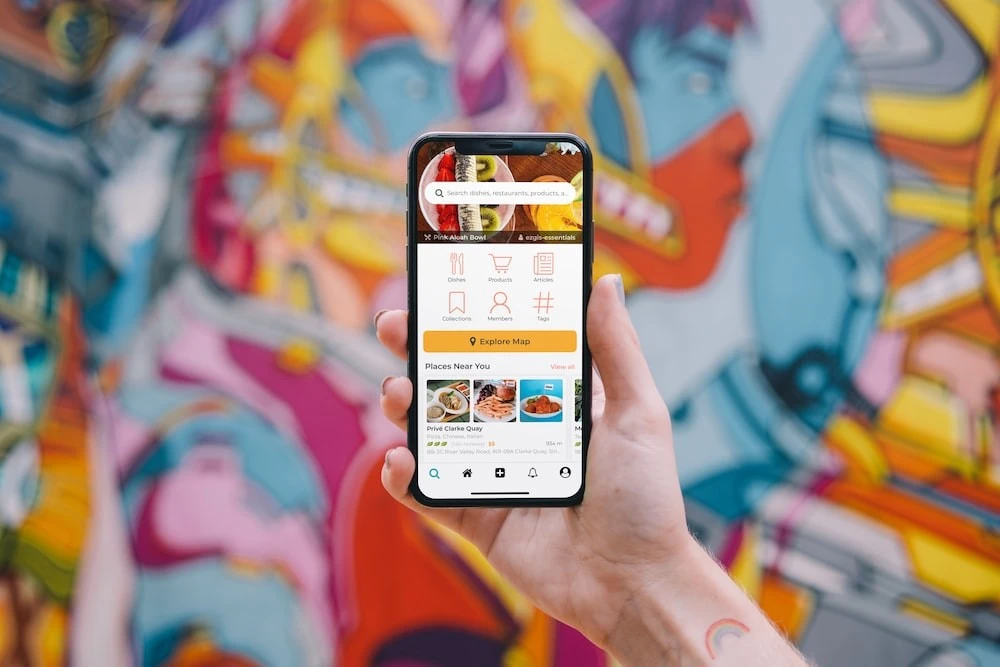
Let’s begin by taking a deeper look at the concept of an enterprise mobile app itself. Unlike the mobile apps we are used to, which are called consumer app, enterprise apps are designed for specific organizations. Each enterprise app may be customized to the needs of that individual company, and is used to improve the performance and efficiency of that organization.
That means that unlike the wide masses the consumer apps are designed for, enterprise apps are designed for, and will be used by the employees of that company. This changes the way the mobile app is developed, as the parameters for success are different from consumers’ apps.
Let’s say a dairy company decides to create a fleet management and delivery app to track the progress of deliveries from the packaging plant to the delivery stores. The system tracks all the shipments released, along with the details of the customer being delivered to, and the details of the delivery lorry and driver.
This will be an app used internally to track the performance and manage the delivery system better, allowing for a more efficient business process. However, let’s say that they release the same app out to other smaller dairies to allow those consumers to use the company’s fleet to deliver their own product to the market. In that scenario, the app is no longer an enterprise mobile app, as it is not limited to the organization itself.
Similarly, there are a lot of cases of enterprise apps being a staple in healthcare software development, as since the advent of COVID-19, hospitals around the world are trying to go digital for better safety and efficiency.
Levels of an Enterprise Mobile App

Now, an enterprise mobile app can be of different types, based on the needs of the organization and the criticality of the functionality being performed. However, if we were asked to break them down into some kind of generic classification, we might say that there are three distinct levels of enterprise mobile app development.
These levels of enterprise mobile apps can be equated to the different functional levels of an organization. The various needs of each business level would require different functional requirements for the same kind of app, such as a project management app, based on the specific needs of the people at that level.
For example, at the employee level, the project management tool would need an in-depth breakdown of the tasks, while the management would require a more, high-level overview of the project. Let’s take a look at the three different levels we generally consider for an enterprise mobile app.
- Employee
The enterprise apps at the employee level are quite easy to understand and develop. For example, let’s say a company has an app that allows their sales people to track their leads, and add the details of a sale they made successfully. This would allow the people to manage their KPIs more efficiently, allowing them to try a variety of different sales approaches regardless of whether they are in the office, or away.
- Department
As a level above the employee level, these enterprise apps are designed to manage the activities of an entire department, and have a much broader scope of work definition. Instead of individual efficiency here, the focus is on department productivity and performance, which changes the scope, and thus the implementation of the mobile app development.
For example, a fleet management software for a drinks manufacturing company would allow them to manage their shipping operation better and more efficiently. it could help them identify better routes, as well as see which routes required a better focus, while which routes were not as feasible anymore. Similarly, and ERP software system in the form of a mobile app could help different departments improve their functions by leveraging technology for better performance.
- Company
This type of enterprise mobile app is designed for an overall, company-wide usage and implementation. The type of mobile app described here is designed to solve a specific problem that is faced throughout the enterprise.
For example, a company decided to go for flexible timings for its employees; however, they need to maintain a minimum average of hours worked at the office. A mobile app that allows them to clock in and out in the proximity of their office premises, via the use of IoT, can be quite a successful company-wide enterprise mobile app.
How Does Enterprise Mobile App Development Process Works
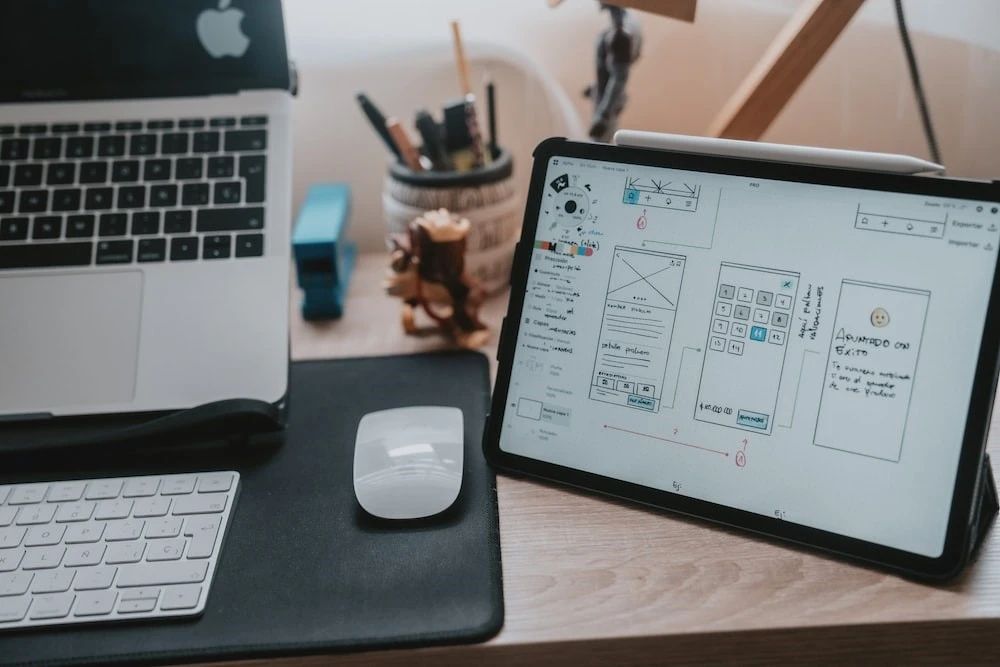
Now that we know the various levels that enterprise mobile app development can take place at, let’s look at the mobile app development process itself that is used to develop an app for an enterprise.
When we talk about the process itself, it refers to the practice of building robust mobile apps to help organizations solve specific problems in order to improve efficiency and productivity. When we talk about robustness, it is a feature that is especially important as it often deals with proprietary company data.
Protecting the integrity and safety of that data is extremely important, which is why enterprise mobile apps are often considered harder to develop. One of the primary reasons for this is that there are often huge databases and dependencies involved in such apps, which can be a problem if the app faces downtime, a data loss or breach, or something in that vein occurs. That is why these factors should be included in your software requirements specification document.
Secondly, and perhaps more importantly, the enterprise must be designed to fit into the existing technological infrastructure of the organization. That is because the app is designed to improve the performance of the organization, not change the tech system of the organization completely. If your app would require drastic changes to the organization’s tech capability, then the purpose of an enterprise app to improve productivity would be moot.
Top 5 Awesome Enterprise Mobile App Development Ideas You Can Use
Knowing the importance of developing an enterprise mobile app, the question is; what kind of an enterprise mobile app can you develop and use to improve the working of your organization? There are a host of benefits that can be enjoyed with just the right mobile app helping your organizational performance.
Let’s look at some awesome mobile app ideas you can incorporate within your company.
Idea 1- Finance and Billing Management App
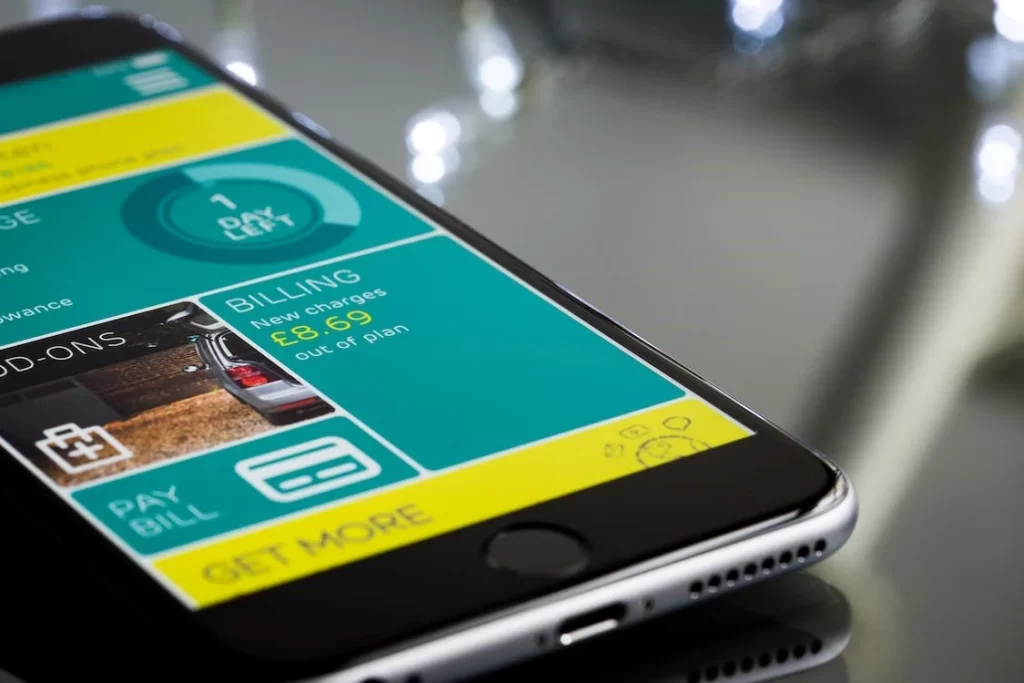
Let’s say you are a company that sells a range of beauty products, but your billing is still managed manually. At the end of the day, the shift manager has to balance the books, ensuring that each receipt and bill is added to the ledger for the day, before they can make their calculations.
This not only takes time, but is also highly inefficient. Failure to log a bill may result in discrepancies in the ledgers, which can be a headache to track down and rectify. However, if the company decided to create an e-billing app, which allows sales people to log the sale and generate its bill online, while automatically logging that sale into an online ledger, is going to be great.
That will not only simplify the process for everyone, including the sales people, but will also ensure that no sale remains unlogged, and that the ledger will automatically be updated accordingly at the end of the day, when the manager closes the business for the day. This type of app works quite well when paired with a well-planned digital transformation strategy.
Idea 2- Enterprise Skill-Building and E-Learning App
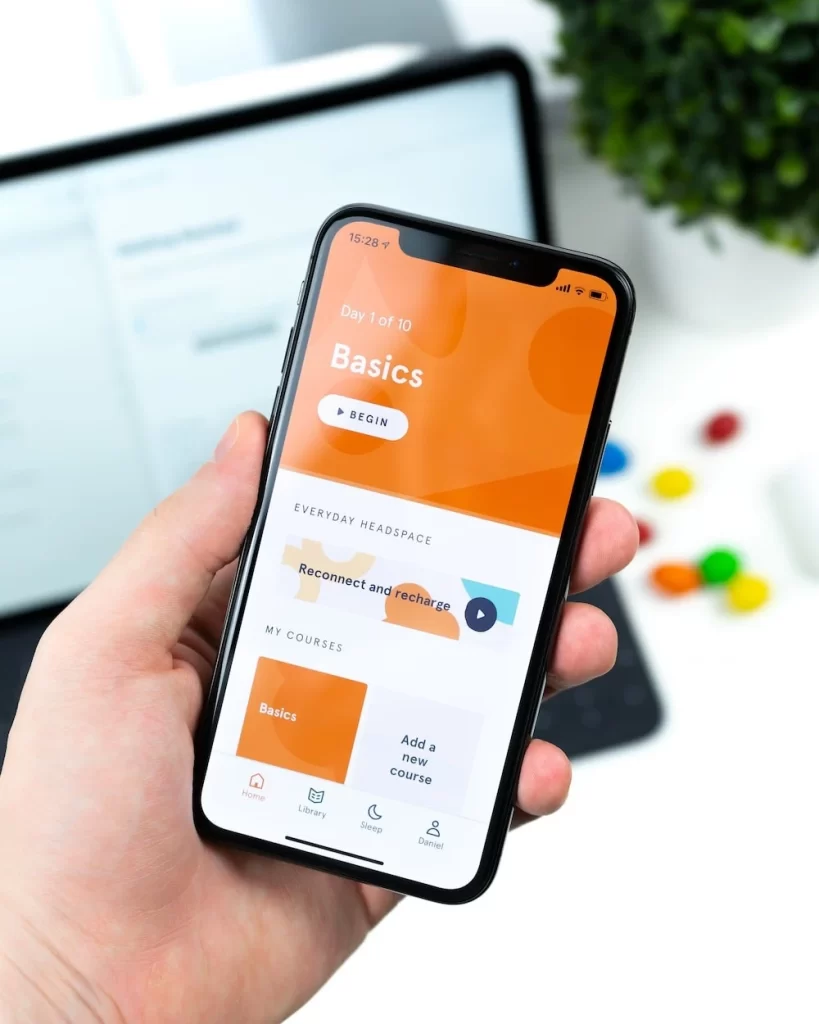
In large organizations, there is a strong emphasis on professional development of their employees, whether its their managers, or their non-managerial staff. In order to facilitate that, companies often build and incorporate a comprehensive knowledge management system.
The purpose of this system is to compile and make accessible for its users a vast array of courses and material for e-learning so that employees can work to develop themselves professionally and personally. That is because people who work to develop themselves into something more than they are now, are the ones who are striving for success. And that is the type of person you want for your company’s advancement.
You can compile and build an e-learning app for your employees that could give your people access to a variety of courses and learning material designed to help them skill up. This will help your business in the long run, as you will have an array of skilled professionals who are constantly looking to improve and grow.
Idea 3- Enterprise Communications App

Sometimes, using an off-the-shelf solution isn’t the best answer to your need. Sometimes, custom software development is what you actually need. In an organization of a certain size, its important to have a proper system of communication to allow people from the same department, as well as between departments, to communicate properly.
Now, there are multiple options in the market which can be used to do so. But your organization has certain special needs, due to which you build a communication app for all your employees. Such an app needs to be highly secure and “idiot-proof”, as there is a chance of the data being mishandled if not addressed properly.
Idea 4- AR Try-Room App for eCommerce

There have been a lot of advancements in the eCommerce industry in recent years, and many players have been trying to introduce new technological advancements in order to improve their efficiency, as well as to connect with their users better.
Suppose you run an optometry business that also makes and sells spectacles and glasses to people. Now, you have been experiencing that many people are leaving the website with items in their cart. After a little investigation, the feedback you receives suggests that as buying a new pair of glasses in expensive, people are reluctant to buy one online without knowing how it looks like on them.
So, you can develop an AR-based app or module within your existing eCommerce app, which would allow consumers to use the power of augmented reality to virtually try on various pairs of glasses before choosing the one that best fits their face and aesthetic.
Idea 5- Community Food Bank App

Let’s say your organization runs a local food bank, which uses items donated by a variety of local stores and restaurants to give to those in need, or for use in your organization’s soup kitchen. Every day, your employees get new shipments from your partners added to the inventory, and every day they have to sort them out manually to calculate how much of each item you have at the end of each day.
Similarly, when someone comes in and asks for something specific, your employees have to go to the storeroom to check the remaining stock manually every time. This takes up a lot of time and effort for the employees, and can cause issues and mistakes due to someone miscalculating the items in stock or failing to update the stock.
You can use an app which would sort the inventory automatically on the basis of the delivery parcels. That means when new shipments arrive from multiple stores, the employees just need to enter them into the inventory system via the app. The app would automatically sort and compile them according to the item.
That means that if you received 10 cans of tomatoes and 4 pounds of chicken in 1 store shipment and 37 cans of tomatoes and 6 pounds of beef in another shipment, you just add the items from each shipment to the app. At the end of it, your employees will be easily able to see that you have 6 pounds of beef, 4 pounds of chicken, and 37 cans of tomatoes. And when one employee gives some of it away to one of your patrons, they can update it on the app and the inventory will automatically adjust itself accordingly.
This will help you improve your service, while at the same time reduce the burden on your employees by a large margin.
Conclusion
In short, there are a lot of benefits to developing an enterprise mobile app for your business, as it can help you address a variety of problems, and help you improve your organization’s performance. However, you need to ensure that you come up with an app that actually helps solve the problem within the existing company dynamic, rather than requiring an extensive overhaul of the entire infrastructure.
Moreover, it should also be robust and secure, which when combined with its interoperability with your organization infrastructure, will determine if it is a successful product.
You might also be interested in reading about Mobile App Ideas here.
FAQs
| 1- How do you define an enterprise mobile app in short? To put it simply, an enterprise mobile app is an app designed to solve a specific problem for an organization or enterprise. It could be a problem for specific set of employees, for a specific department, or even for the entire organization. |
| 2- How do I create an enterprise app? In order to create an enterprise app, you need to gather the information from the internal stakeholders, and use that to define a proper scope of the project. You need to focus on security and dependability as your primary focuses, as internal apps need to be highly secure and robust in nature. |
| 3- What are the four key types of enterprise software applications? The four primary types of enterprise software include: – Enterprise resource planning systems (ERP) – Supply chain management systems (SCM) – Customer relationship management systems (CRM) – Knowledge management systems (KMS) |
Empower your digital initiatives with BariTechSol, a premier custom software development company. Our skilled team tailors cutting-edge solutions to your unique needs. Elevate your tech experience and stay ahead in the digital realm. Partner with BaritechSol and code the success of your next big idea.
